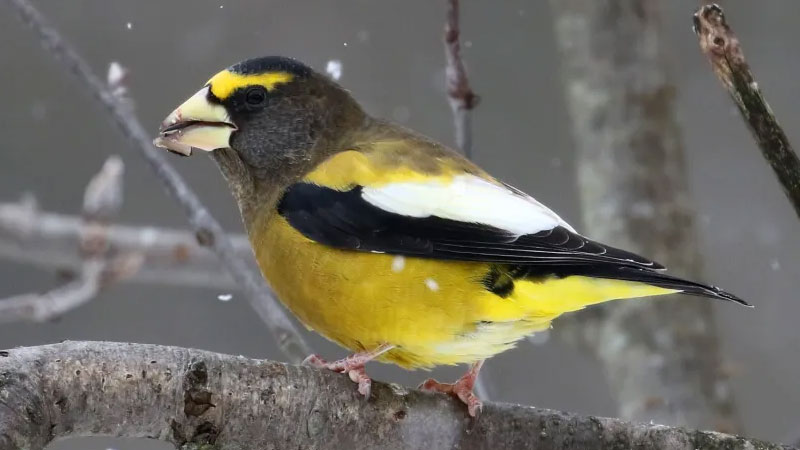The Evening Grosbeak Project
International Road to Recovery
Photo: @ Jay McGowan

FiRN is dedicated to the study and conservation of finches and their habitats globally. The Evening Grosbeak has declined 92% since 1970 and is listed as a species of conservation concern!
For a Road to Recovery Webinar that David and I gave in December giving an overview of the project click here: https://www.youtube.com/watch?v=1aqdDYl9lcA
With a 92% decline since 1970, evening grosbeak (Coccothraustes vespertinus) was cited as the steepest declining landbird in the continental United States and Canada in the Partners in Flight 2016 Landbird Conservation Plan. Causes for the decline are not fully understood, but may be a result of several factors including spruce budworm (Choristoneura spp.) population cycles, forest alteration and loss, collision and disease mortalities, and climate change factors. Following several conservation listings, evening grosbeak has garnered conservation attention from the recently formed Road to Recovery (R2R) Initiative as it was called out as one of 91 bird Species on the Brink of Endangerment.
From February 2022 through April 2025, members of our team (Finch Research Network (FiRN) Pennsylvania Natural Heritage Program at the Western Pennsylvania Conservancy (WPC) and Powdermill Avian Research Center at the Carnegie Museum of Natural History (CMNH) have ventured into the field at Sax Zim Bog in Minnesota, Aroostock County northern Maine, Allegheny National Forest in PA, Central NY and the Adirondacks of upstate NY, the UP of Michigan, northern VT and NH, and out west to Utah to study Evening Grosbeaks, and we’ve color-banding 508 birds and have deployed 180 nanotags 86 satellite tags and 2 GPS tags. From the 86 satellite tags we’ve already received over 20,000 positions transmitted with some of the birds tagged moving to Quebec, Ontario, New Brunswick and Manitoba for the breeding season. As fundraising continues we hope to start banding and tagging in the Oregon and Canada in the next few years.
All this work is part of an International Road to Recovery Working Group for the Evening Grosbeak, a species recognized of high urgency.
Donate click here: Donate – FINCH RESEARCH NETWORK (finchnetwork.org)
Purpose is to look at reasons for the decline, and to provide a stable, long-term home for Evening Grosbeak research over a broad front: population declines, field observations, recordings, assortative mating and call type delineation by sound, range and DNA. Provide information to the scientific community on the validity of call types and potential full-species separations for flight call types. One purpose would be to serve as arbiters of flight call determination via audiospectrographic analysis for this North American species.
Object of Study
Look into population declines, assortative mating, morphometrics, flight call variations and genetics for all call types, but especially with Type 1 which overlaps with all the other call types to some degree.
Submit your sightings to eBird (including type and audio) to help answer some nagging questions:
- What is causing the declines?
- To what extent will Type 1’s irrupt from year to year? Distance? Quantity?
- Are the types geographically isolated during the breeding season?
- Do they overlap in parts of their range but only breed with the same type?
- What other, more complex things may be happening on the breeding and wintering grounds?
- Do Types form mixed flocks during the winter
Also see: Tracking Irruptive Movements of Wintering Evening Grosbeaks (Coccothraustes vespertinus) from Western Pennsylvania.
https://finchnetwork.org/wintering-evening-grosbeak-movements
The Evening Grosbeak Road to Recovery Project is a collaboration of the Western Pennsylvania Conservancy’s Natural Heritage Program (PNHP), the Carnegie Museum of Natural History’s Powdermill Avian Research Center and The Finchmasters – Finch Research Network.
#birds #birding #conservation #tshirt
The Finch Research Network (FiRN) is a nonprofit, and has been granted 501c3 status. FiRN is committed to researching and protecting finch species like the Evening Grosbeak and more. The Evening Grosbeak has declined 92% since 1970. We are fundraising around an Evening Grosbeak Road to Recovery project in addition to a student research project, so please think about supporting our efforts and making a small donation at the donate link below.
Donate – FINCH RESEARCH NETWORK (finchnetwork.org)
Go to species account: LINK
If you would like to know more about or want to contribute to this project, please get in touch with Matt and see Western Pennsylvania Conservancy Road to Recovery link.




